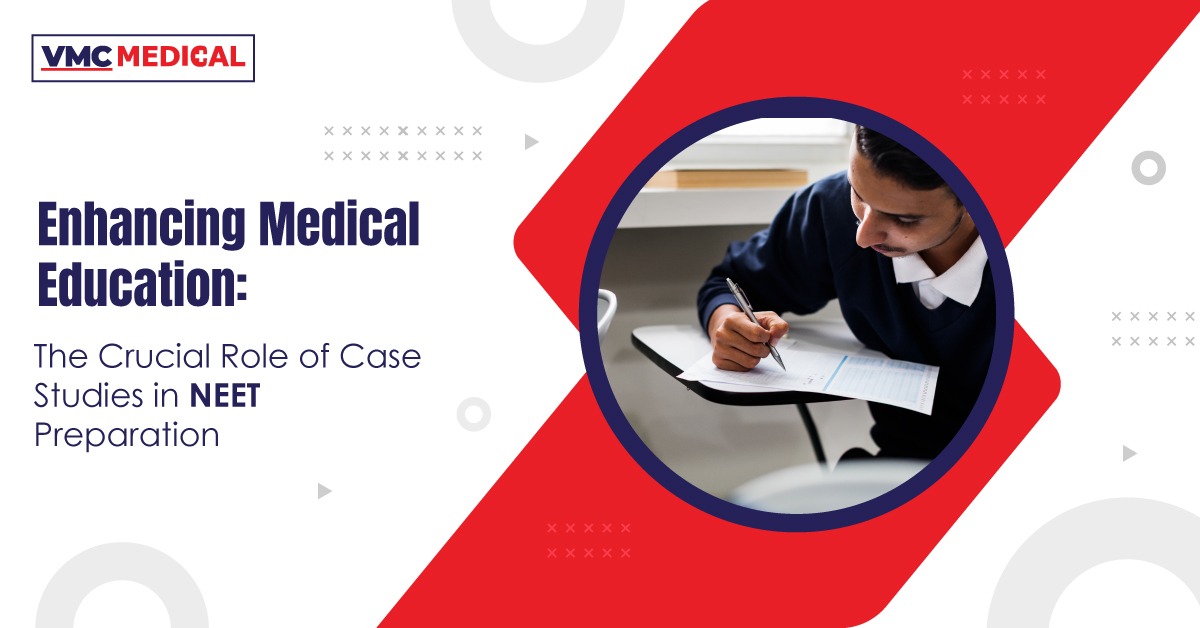Enhancing Medical Education: The Crucial Role of Case Studies in NEET Exam Preparation
 Posted On
Posted On
358 total views, 2 views today
In the realm of medical education, the National Eligibility cum Entrance Test (NEET) stands as a crucial milestone for aspiring healthcare professionals. Among its various components, case studies emerge as a cornerstone in evaluating students’ comprehension and practical application of medical concepts within real-life scenarios. This blog delves into the significance of case studies in the NEET exam, highlighting their pivotal role in assessing clinical reasoning, problem-solving skills, and bridging the gap between theoretical knowledge and practical implementation in the field of medicine.
Understanding the Essence of Case Studies: At the heart of medical education lie case studies – meticulously crafted scenarios mirroring authentic clinical encounters. These scenarios intricately weave together patient histories, symptoms, and pertinent diagnostic data, challenging candidates to diagnose and prescribe suitable treatment modalities. By immersing students in these case-based inquiries, the NEET exam evaluates not only their theoretical proficiency but also their adeptness in applying medical principles to real-world scenarios.
The Significance of Case Studies in NEET: The inclusion of case studies in the NEET exam holds profound significance. It serves as a litmus test for students’ ability to seamlessly transition from theoretical learning to pragmatic application within clinical settings. Through the analysis of complex scenarios, candidates are compelled to exercise critical thinking, thereby honing their diagnostic acumen and decision-making prowess – attributes indispensable in the realm of medicine.
Fostering Clinical Reasoning and Decision-Making: Case studies serve as catalysts for enhancing students’ clinical reasoning and decision-making abilities. They necessitate a systematic approach encompassing meticulous symptom evaluation, astute interpretation of laboratory findings, and thoughtful consideration of potential differential diagnoses. By navigating through these intricacies, candidates cultivate a holistic perspective towards patient care, enriching their problem-solving skills in the process.
Bridging the Gap Between Theory and Practice: A hallmark of medical education lies in its ability to bridge the chasm between theoretical knowledge and practical implementation. Case studies in the NEET exam play a pivotal role in achieving this synergy. By immersing students in realistic clinical scenarios, they are compelled to integrate theoretical concepts with practical applications, thereby fortifying their competence in delivering patient-centric care.
Enhancing Problem-Solving Skills: At its core, medicine demands a nuanced approach towards problem-solving. Case studies serve as crucibles for nurturing this indispensable skill set among aspiring healthcare professionals. By navigating through multifaceted scenarios, students learn to dissect complex clinical presentations, consider diverse patient factors, and devise comprehensive management strategies – all essential facets of adept medical practice.
The Way Forward: As we navigate the ever-evolving landscape of medical education, the role of case studies in the NEET exam remains paramount. These immersive learning experiences not only assess students’ theoretical knowledge but also cultivate essential skills vital for thriving in the dynamic field of healthcare. Embracing the challenges presented by case studies empowers students to evolve into compassionate, competent, and astute healthcare professionals – equipped to navigate the complexities of modern medical practice with finesse and proficiency.
Closing Thoughts:
In the tapestry of medical education, case studies stand as threads of invaluable learning experiences. Within the context of the NEET exam, these scenarios serve as conduits for assessing and nurturing students’ clinical acumen, problem-solving abilities, and capacity for bridging the gap between theoretical understanding and practical application. Aspiring healthcare professionals must embrace the challenges posed by case studies, viewing them not as hurdles but as opportunities for growth and mastery within the dynamic realm of medicine.



